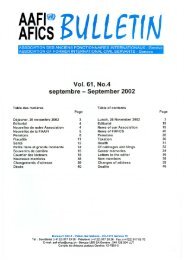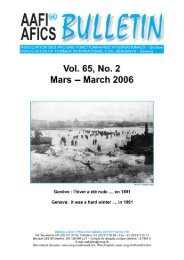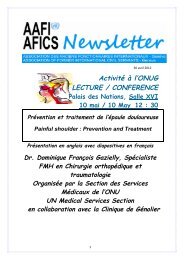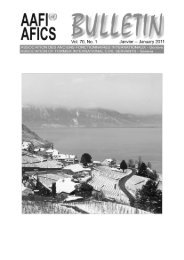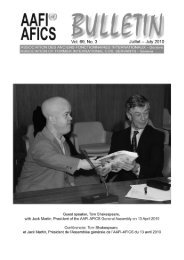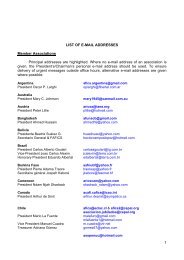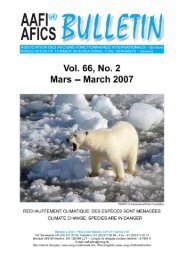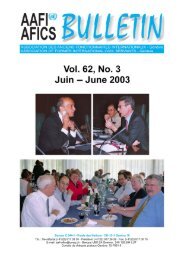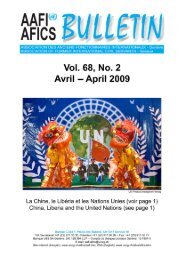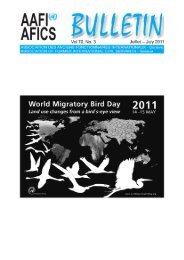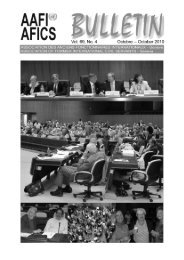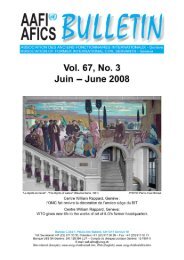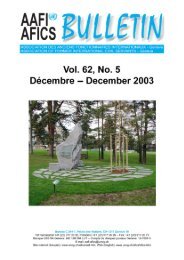VOL. 66, NO. 5 - aafi-afics - UNOG
VOL. 66, NO. 5 - aafi-afics - UNOG
VOL. 66, NO. 5 - aafi-afics - UNOG
You also want an ePaper? Increase the reach of your titles
YUMPU automatically turns print PDFs into web optimized ePapers that Google loves.
MR BAN KI-MOON’S VISION FOROUR UNITED NATIONSAt a seminar in Turin (31 August-2 September) on four main themes: shaping the UN to meet globalchallenges, communicating with one voice, managing for results and new horizons, Mr Ban Kimoon,the UN Secretary-General, addressed some 50 top UN officials as follows:I have been asked to speak on My Vision for OurUN. I use the word ‘‘our’’ deliberately, becausethis UN is very much ours. The United Nationscan be more than the sum of our efforts if weproduce synergy, together. We are Team UN, ifyou will, working for the world.Let me say, here, something about how I see OurUN. When I was a middle school boy, myprincipal told us that you should keep your headabove the clouds, your feet on the ground and youshould walk slowly, step by step. That, I havepracticed during my entire life. I am not aphilosopher. I have never put much stock ingrand rhetoric – dreams for the future, “visions”that promise more than can be delivered. I am arealist, a man of action. I believe in results, notrhetoric.I want to emphasize this at the outset – theimportance of results, action, delivery – because itis the essence of how I see our shared mission.As I look out at the coming year, and beyond, Isee a growing number of extraordinarychallenges.Darfur, where we are about to field one of thelargest peacekeeping force in our history. Iraq,where we are likely to be tasked with ever greaterresponsibilities. Climate change. Makingdevelopment work in Africa, so that we can fullyrealize our Millennium Developments Goals.The list goes on, from Somalia and the MiddleEast to new crises and opportunities that theworld will bring our way. I think it is fair to say thatthe demands to be placed upon us have neverbeen greater in our 62-year history, even as theresources available to us grow proportionatelymore scarce.I thought about this recently when I visited SanFrancisco, the birthplace of the UN. Perhaps Ican share an interesting historical fact. At thetime the UN was founded, in 1945, 80 percent ofAmericans believed in its supreme importance.The figure was even higher elsewhere in theworld.Today, six decades later, it’s roughly the same.Between 74 percent and 79 percent of Americanstill believe in the importance of the UN and itsmost essential missions – from peacekeeping andhumanitarian intervention to our role as a globalchampion of human rights. That figure is evenhigher elsewhere in the world.But here’s the problem: only 37 percent ofAmericans think we can be trusted to deliver.That popular perception, too, is share elsewherein the world, as we will hear from a pair ofinternational polling experts during ourcommunications panel tomorrow.The pendulum of history swings. The standing ofour UN rises and falls with world events – andpublic perceptions of how well we do our job. TheUN has won a dozen Nobel Prizes, most recentlyin 1988 and 2001. We have gone from highs –our missions in Namibia and Mozambique, say –to lows defined by humanitarian failures inRwanda or Bosnia, or by sexual abuse orprocurement scandals.Now, the pendulum is again swinging – this timein our favour. There is, today, a new appreciationfor multilateralism and diplomacy. Newchallenges have emerged that are best dealt withthrough the UN. Terrorism. The threat ofpandemics and infectious diseases. Globalwarming. The growing and appallingly wide dividebetween those who go hungry across the world,and those who have the good fortune to live well.It is a cliché to say that global problems requireglobal solutions. But they do. We must be thesolution, not part of the problem.I would not go so far as to call this a new SanFrancisco moment. But it is close. We mustseize this opportunity. It will decide the future ofour UN.Again, I refer to “our” UN. We must do thistogether – among ourselves, working as a team,in partnership with the member states. And wecan do this only by changing ourselves – the waywe go about our business, how we work togetheras a UN family, departments and agencies andprograms pulling as one.This is the essence of system-wide coherence –single purpose in pursuit of our common goals.28



